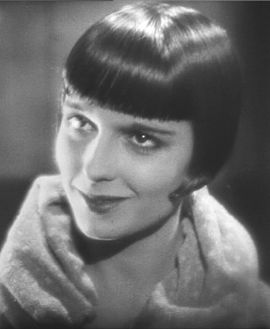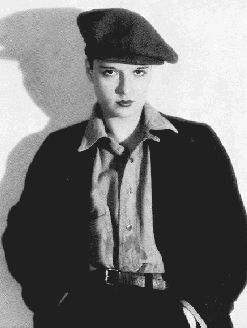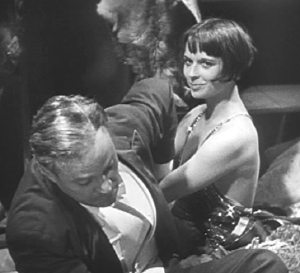
LOUISe BROOKS AT THE NFT  ouise
Brooks, who appeared in silent and a few sound films in the
1920s and
early thirties, has something of a cult reputation, and the National
Film Theatre has
been running a season of her films. In two of the earliest she appears
as a support player. In It's
the Old Army Game (1926), which stars the
great comedian W.C.Fields,
she has little to do except look pretty and
provide a small love sub-plot with another minor character: in The Show
Off (also 1926) she plays the girl next door and
adds a
little sparkle
to an otherwise rather dull comedy starring Ford
Sterling (once a
Keystone Cop and by 1926 a comedy lead player) as a self-important
fantasist and liar, and Lois
Wilson - adequate rather than good - as
his wife. In both films Brooks is attractive and appealing and
certainly shows star quality, though no more than many other actresses
of the period. ouise
Brooks, who appeared in silent and a few sound films in the
1920s and
early thirties, has something of a cult reputation, and the National
Film Theatre has
been running a season of her films. In two of the earliest she appears
as a support player. In It's
the Old Army Game (1926), which stars the
great comedian W.C.Fields,
she has little to do except look pretty and
provide a small love sub-plot with another minor character: in The Show
Off (also 1926) she plays the girl next door and
adds a
little sparkle
to an otherwise rather dull comedy starring Ford
Sterling (once a
Keystone Cop and by 1926 a comedy lead player) as a self-important
fantasist and liar, and Lois
Wilson - adequate rather than good - as
his wife. In both films Brooks is attractive and appealing and
certainly shows star quality, though no more than many other actresses
of the period.She made another eight films in Hollywood over the next two years, becoming increasingly famous: the best are the last two, A Girl in Every Port (1928) and Beggars of Life (1928).  In the latter she goes
on the run disguised as a
boy (character
portrait, left), a
part
which suited her direct, challenging gaze which distinguished
many of her publicity photos as well as her performances. She starred
with Richard
Arlen and Wallace
Beery. In the latter she goes
on the run disguised as a
boy (character
portrait, left), a
part
which suited her direct, challenging gaze which distinguished
many of her publicity photos as well as her performances. She starred
with Richard
Arlen and Wallace
Beery.So far we see an actress with a good deal of star quality: but the great German director G.W.Pabst saw something more and brought her to German to star in two of his films. The second, Diary of a Lost Girl (1929), shows something far beyond her Hollywood performances (and was sufficiently disturbing to be cut to ribbons by the censors): but in the first, Pandora's Box (1928), she gives perhaps the most hair-raising performance in the history of the cinema. The film is based on Franz Wedekind's two 'Lulu' plays: Brooks's character, Lulu (top picture), is simultaneously totally naive and completely corrupt - a woman who is attractive but trouble.  She is the
mistress of the powerful Dr. Schön, but also involved with a
couple of dubious characters, and Schön's son has fallen in
love with her. When Schön tries to terminate the relationship
to get engaged to a respectable woman she throws a tantrum and then
seduces him, delighted
that his fiancée discovers them (still, right).
This puts him in the position of having to marry Lulu. Discovering her
with his son on the wedding
day he tries to force her to shoot herself but is killed himself in the
struggle. Condemned for murder, Lulu escapes and hides out with the
son, the dubious companions, and a lesbian admirer (whose advances she
doesn't understand) on a seamy gambling boat; then, penniless, flees to
London where she becomes a streetwalker and is killed by Jack the
Ripper. Powerful stuff, even now, and devastating in 1928. She is the
mistress of the powerful Dr. Schön, but also involved with a
couple of dubious characters, and Schön's son has fallen in
love with her. When Schön tries to terminate the relationship
to get engaged to a respectable woman she throws a tantrum and then
seduces him, delighted
that his fiancée discovers them (still, right).
This puts him in the position of having to marry Lulu. Discovering her
with his son on the wedding
day he tries to force her to shoot herself but is killed himself in the
struggle. Condemned for murder, Lulu escapes and hides out with the
son, the dubious companions, and a lesbian admirer (whose advances she
doesn't understand) on a seamy gambling boat; then, penniless, flees to
London where she becomes a streetwalker and is killed by Jack the
Ripper. Powerful stuff, even now, and devastating in 1928.It is on these two Pabst films that her cult reputation depends; she never did anything as good again and her remaining Hollywood career was short and unremarkable. But Pandora's Box alone is one of cinema's greatest films (and well acted by all the fine cast), and has made her a lasting icon in cinema history. Pandora's Box (together with an interesting documentary on Louise Brooks) is available on DVD: UK / USA Posted by Roger Wilmut at 0913 on December 28th 2006 Return to weblog | | | Quick Links About
Me: Roger Wilmut XML/RSS
Feed
MY
PODCAST
Archives
Calendar
Blogroll
WEBRINGS
Statistics | ||||||||||||||||||


